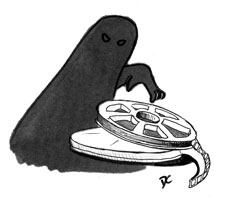Staff Editorial: Wrong move

Online Poster
November 11, 2004
Last week, the Motion Picture Association of America announced it would begin filing lawsuits against individuals who make copyrighted films available for downloading over the Internet. According to Dan Glickman, president of the MPAA, “If we didn’t act now, this behavior would become more and more common in American life.”
But are lawsuits the real answer to online piracy? It’s been a little more than a year since the recording industry began making an example of people who illegally distributed music over the Internet. Despite more than 6,191 lawsuits, the number of peer-to-peer file sharers has continued to rise.
In all fairness, there is little justification for digital piracy. Even though movie studios often charge ridiculous prices, continue to post record earnings and leave little profits for artists and theater chains, it’s no excuse for making someone else’s intellectual property available for download for free. Although there is no physical theft or monetary profit from copying a digital file, the consumer ultimately avoids its cost.
Glickman argues that movie piracy will become increasingly more commonplace in the future. However, there are several barriers that prevent its widespread acceptance. For one thing, individuals must have access to a computer, broadband Internet and possess the technical know-how to use peer-to-peer software programs such as Kazaa or Bittorrent. Movies currently in theaters typically appear online as shoddy bootlegs filmed with digital camcorders. Consumers have more of an incentive to pay for a ticket, if only because the theater experience and quality of the picture and sound is completely lost. Because of this, online piracy is a crime mainly committed by the middle and upper-classes. Although it should be taken seriously, the degree to which it impacts the movie industry should not be overblown.
What, then, are the solutions? Some argue that peer-to-peer software companies should be held liable for digital piracy. However, the motion picture industry made similar argument against Sony’s Betamax videotape recorder in the 1980s and failed to keep the device from reaching the market, largely because the courts ruled that the design could be used for legitimate purposes. Others claim that Apple’s iTunes online music store has been wildly successful in legitimizing music downloads. Although Apple sold more than 100 million downloads in its first 15 months of operation, this pales in comparison to the more than 5 billion files that are traded over Kazaa each month.
Get The Daily Illini in your inbox!
As long as files are made available for free, users will continue to flock to the illegal file-sharing sites. Creating incentives for consumers to pay for digital products is the solution that will prevent piracy. Many fans, for example, would still purchase or rent movie DVDs if they contain extra features that can’t be found in a simple pirated file. Additionally, colleges across the country have purchased bulk accounts from Napster’s music service, giving students unlimited access to streaming music for modest fees. This same model eventually could be applied to film downloads.
In the end, lawsuits against online pirates might decrease downloads in the short run, but as is the case with the recording industry, the move will have no long-term effect on downloading behavior. In fact, these lawsuits could create a backlash among consumers who already feel they are being taken advantage of by the movie industry’s pricing structure. The answer lies in creating a new business model that embraces and accommodates peer-to-peer file sharing, rather than to attack its users.






